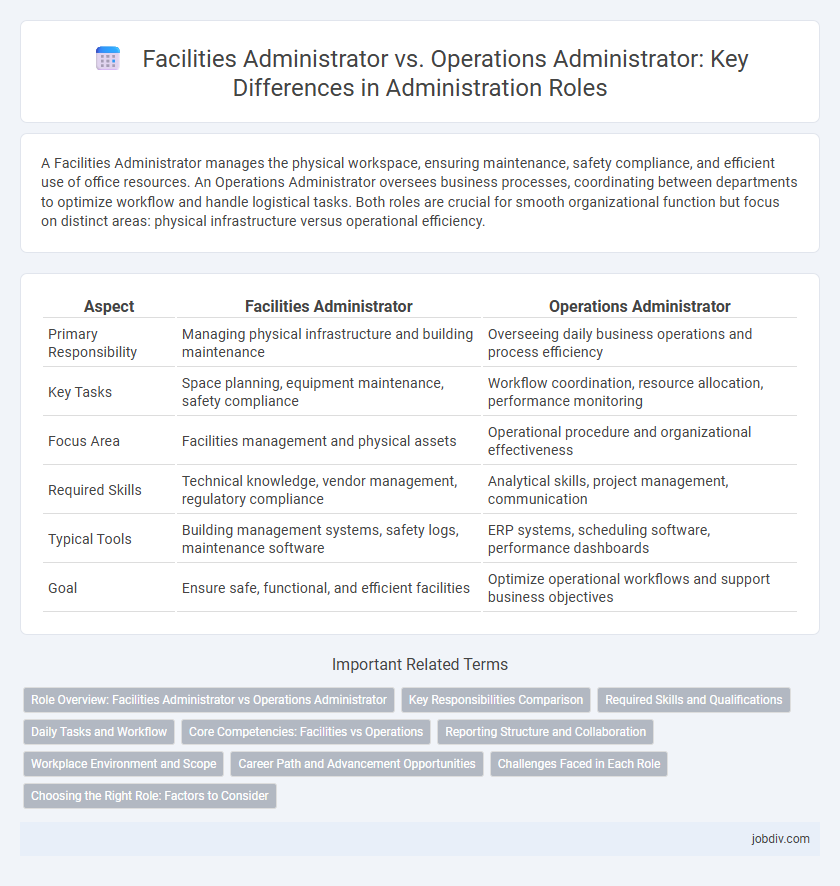A Facilities Administrator manages the physical workspace, ensuring maintenance, safety compliance, and efficient use of office resources. An Operations Administrator oversees business processes, coordinating between departments to optimize workflow and handle logistical tasks. Both roles are crucial for smooth organizational function but focus on distinct areas: physical infrastructure versus operational efficiency.
Table of Comparison
| Aspect | Facilities Administrator | Operations Administrator |
|---|---|---|
| Primary Responsibility | Managing physical infrastructure and building maintenance | Overseeing daily business operations and process efficiency |
| Key Tasks | Space planning, equipment maintenance, safety compliance | Workflow coordination, resource allocation, performance monitoring |
| Focus Area | Facilities management and physical assets | Operational procedure and organizational effectiveness |
| Required Skills | Technical knowledge, vendor management, regulatory compliance | Analytical skills, project management, communication |
| Typical Tools | Building management systems, safety logs, maintenance software | ERP systems, scheduling software, performance dashboards |
| Goal | Ensure safe, functional, and efficient facilities | Optimize operational workflows and support business objectives |
Role Overview: Facilities Administrator vs Operations Administrator
Facilities Administrators oversee the management and maintenance of physical buildings, ensuring safety compliance, space utilization, and coordination of repairs or renovations. Operations Administrators manage overall business processes, including workflow optimization, resource allocation, and support for strategic initiatives to enhance operational efficiency. Both roles require strong organizational skills, but Facilities Administrators focus specifically on infrastructure, while Operations Administrators have a broader scope covering daily business operations.
Key Responsibilities Comparison
Facilities Administrators manage the upkeep, safety, and functionality of physical buildings, overseeing maintenance, space planning, and vendor coordination. Operations Administrators focus on streamlining business processes, managing workflow, and supporting daily organizational activities to enhance efficiency. Both roles require strong organizational skills, but Facilities Administrators concentrate on physical asset management, while Operations Administrators prioritize operational continuity and process optimization.
Required Skills and Qualifications
Facilities Administrators require expertise in building maintenance, vendor management, and compliance with safety regulations, often necessitating certifications such as OSHA or facilities management credentials. Operations Administrators prioritize skills in process optimization, supply chain coordination, and data analysis, frequently demanding experience with ERP systems and project management certifications like PMP. Both roles benefit from strong communication skills, problem-solving abilities, and proficiency in office software, but their technical qualifications differ based on operational focus.
Daily Tasks and Workflow
Facilities Administrators oversee the maintenance, safety, and functionality of physical buildings, managing tasks like coordinating repairs, scheduling inspections, and ensuring compliance with health and safety regulations. Operations Administrators focus on streamlining organizational processes, handling workflow management, coordinating between departments, and optimizing resource allocation to support business functions. Both roles require strong organizational skills but differ in focus, with Facilities Administrators managing tangible assets and infrastructure while Operations Administrators manage internal procedures and operational efficiency.
Core Competencies: Facilities vs Operations
Facilities Administrators excel in managing building maintenance, space planning, and safety compliance, ensuring smooth physical environment operations. Operations Administrators focus on optimizing organizational processes, workflow management, and resource allocation to enhance overall business efficiency. Both roles require strong communication, problem-solving skills, and proficiency in administrative software to support their respective core functions effectively.
Reporting Structure and Collaboration
Facilities Administrators typically report to Facilities Managers or Director of Operations, overseeing building maintenance and space management, ensuring compliance with safety regulations. Operations Administrators often report to Operations Managers or COOs, coordinating cross-departmental workflows and process improvements to enhance overall efficiency. Collaboration for Facilities Administrators centers on maintenance teams and vendors, while Operations Administrators engage closely with finance, HR, and IT departments to streamline operational functions.
Workplace Environment and Scope
Facilities Administrators concentrate on managing physical workplace environments, including maintenance, safety compliance, and space optimization, ensuring operational efficiency within buildings. Operations Administrators oversee broader organizational processes, such as workflow coordination, resource allocation, and policy implementation, impacting overall business functions beyond just the physical workspace. The Facilities role emphasizes tangible assets and infrastructure, while Operations focuses on systemic processes and interdepartmental collaboration.
Career Path and Advancement Opportunities
Facilities Administrators typically advance by gaining expertise in building management, safety compliance, and vendor relations, often progressing to Facilities Manager or Director roles. Operations Administrators build their careers by optimizing organizational processes, mastering project coordination, and resource management, with potential growth into Operations Manager or Chief Operating Officer positions. Both paths offer opportunities for strategic leadership roles within corporate administration, where advanced certifications like PMP or IFMA can enhance career prospects.
Challenges Faced in Each Role
Facilities Administrators often face challenges related to maintaining physical infrastructure, managing vendor relationships, and ensuring compliance with safety regulations. Operations Administrators encounter difficulties in coordinating cross-departmental workflows, optimizing resource allocation, and streamlining process efficiency. Both roles require strong problem-solving skills but differ in their focus on physical environment management versus organizational process optimization.
Choosing the Right Role: Factors to Consider
Choosing between a Facilities Administrator and an Operations Administrator involves assessing organizational needs, as Facilities Administrators focus on managing physical environments, maintenance, and safety compliance, while Operations Administrators oversee daily business processes, resource allocation, and workflow efficiency. Consider factors such as the scale of physical assets, complexity of operational procedures, and priority for regulatory adherence or productivity optimization. Evaluating the specific skills required, such as knowledge of building systems versus expertise in process management, can guide the decision toward the role that best supports strategic business goals.
Facilities Administrator vs Operations Administrator Infographic

 jobdiv.com
jobdiv.com